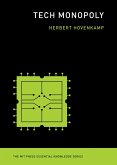If you buy a book at the bookstore, you own it. You can take it home, scribble in the margins, put in on the shelf, lend it to a friend, sell it at a garage sale. But is the same thing true for the ebooks or other digital goods you buy? Retailers and copyright holders argue that you don't own those purchases, you merely license them. That means your ebook vendor can delete the book from your device without warning or explanation—as Amazon deleted Orwell's 1984 from the Kindles of surprised readers several years ago. These readers thought they owned their copies of 1984. Until, it turned out, they didn't. In The End of Ownership, Aaron Perzanowski and Jason Schultz explore how notions of ownership have shifted in the digital marketplace, and make an argument for the benefits of personal property.
Of course, ebooks, cloud storage, streaming, and other digital goods offer users convenience and flexibility. But, Perzanowski and Schultz warn, consumers should be aware of the tradeoffs involving user constraints, permanence, and privacy. The rights of private property are clear, but few people manage to read their end user agreements. Perzanowski and Schultz argue that introducing aspects of private property and ownership into the digital marketplace would offer both legal and economic benefits. But, most important, it would affirm our sense of self-direction and autonomy. If we own our purchases, we are free to make whatever lawful use of them we please. Technology need not constrain our freedom; it can also empower us.
Dieser Download kann aus rechtlichen Gründen nur mit Rechnungsadresse in A, B, BG, CY, CZ, D, DK, EW, E, FIN, F, GR, HR, H, IRL, I, LT, L, LR, M, NL, PL, P, R, S, SLO, SK ausgeliefert werden.
Hinweis: Dieser Artikel kann nur an eine deutsche Lieferadresse ausgeliefert werden.
[Perzanowski and Schultz] are expert writers in distilling complicated topics and treating acronyms usually reserved for those in the legal community to be handled by interested laymen.... [I]t's important for consumers looking to make informed decisions to read The End of Ownership not just for the legal and economic trivia you will inevitably pick up, but because of how relevant the book already is and, based on current trends, how even more relevant it will become.
PopMatters
This is a livelymust-read account of how digital formats have led to an unprecedented transformation of property law. Perzanowski and Schultz are law professors who specialize in intellectual property, and they argue that consumers need to be aware of the tradeoffs that come with the so-called freedom of cloud storage and streaming services.
Ars Technica
The End of Ownership presents the confusing world of the digital consumer in wonderfully accessible prose, replacing hideous jargon with the simplest of analogies, from thieving bookshops to the goblins from Harry Potter. It will answer the questions you have regarding digital ownership, and it's inevitable that more than a few of them have never even crossed your mind. In an increasingly complex world, plagued by unreadable (certainly unread) terms and conditions, it is more than a little refreshing to have something explained in good, plain English.
E & T: Engineering & Technology









